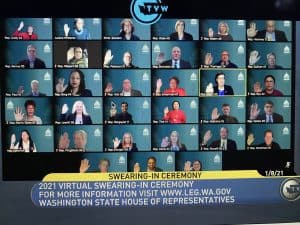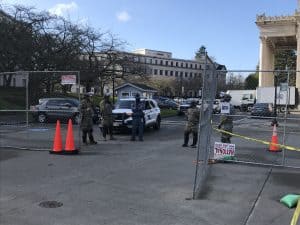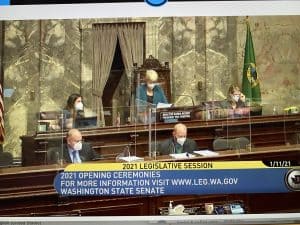Trivia’s Back!
With the focus at the U.S. Capitol this week, I became curious about federal connections to our Washington State Legislature. As a result of my late night Internet searches, we have a two-prong trivia question this week:
- The Washington State Congressional delegation is comprised of two U.S. Senators and 10 members of the U.S. House of Representatives. How many members of our Washington State Congressional delegation previously served in the Washington State Legislature?
- Of those current members of our delegation who served in our Legislature, who was the most recent member to serve in our state Legislature and who was first elected to our state Legislature?
Start Early Washington Resources
As an organization just celebrating its one-year anniversary, Start Early Washington is working to build out its website and while it is a work in progress, we wanted to flag some resources that may be helpful:
- Summary of the Fair Start Act. This summary reflects the bill as introduced and we will be updating as the bill is amended.
- Working Connections Child Care Co-Payment Reform. Reforming the Working Connections Child Care Co-Payment structure is one of our top priorities and this document details the issue and includes recommendations for improvement.
- Home Visiting During the COVID Era. This document summarizes how Washington’s home visitors have pivoted to provide telehealth/virtual visits while continuing to be a resource and support to families.
- We also have up our 2021 public policy priorities and the Home Visiting Advocacy Coalition’s legislative leave-behind.
- Finally, you can go back and review archived Notes from Olympia.
Highlights of the Week
Settling in to this virtual session. We are now on day 12 of a 105-day virtual legislative session and navigating this new system is already “old hat” to lawmakers, staff, lobbyists and citizens engaging in the legislative process alike. Well, kind of.
One of the biggest takeaways so far is the continued realization that this process is simply going to take longer. Last week we discussed the logistics involved for pulling off virtual hearings and while the legislative staff is really doing a herculean job, hiccups are bound to happen in nearly every hearing and floor session. For those who had growing their patience as a 2021 New Year’s resolution, there will be ample opportunity to build that muscle.
Revenue collections to exceed forecasts. On Thursday, the state’s Economic and Revenue Forecast Council released its January report. The good news is that General-Fund State contributions for December 11, 2020 – January 10, 2021 are $260.7 million (or 14.9%) higher than forecasted. Our state’s hot real estate market continues to help fuel these increases. The next official revenue report will come out on March 17, 2021 and those numbers will influence the 2021-23 budget building process
Fiscal committees hold work sessions. With the focus largely on policy committees in the first few weeks of the legislative session, the Senate Ways and Means and House Appropriations Committees often use that time to educate their members on the budget process and do deep dives on specific issues. On Monday, the House Appropriations Committee had a briefing on budget basics. The state budgeting process is incredibly complex and opaque, but this powerpoint provides some insights into the overall process and the decision points facing legislators engaged in budget writing.
On Tuesday, the Senate Ways and Means Committee received a bipartisan report from the Washington State Senate Special Committee on Economic Recovery. Chaired by Senators David Frockt and Shelly Short, the special committee was formed in May 2020 and was charged with evaluating the impact of the pandemic on our economy and developing recommendations on how to help workers and employers in our state’s recovery. Child care was a key focus of the select committee’s review and recommendations. The report calls for investments in Working Connections Child Care reimbursement rates support for providers to increase supply and additional capital investment in early learning facilities. I understand Senators Frockt and Short will be on an upcoming episode of TVW’s “Inside Olympia” where they will discuss this report and the importance of child care in our state’s recovery. I will include a link in next week’s Notes.
“Early Action Bill” to be announced. Either tonight or over the weekend, details are expected to be released about an “Early Action Bill” meant to respond to imminent needs resulting from the pandemic, funded by dollars received from the federal stimulus package passed at the end of 2020 and some state funding. We expect this Early Action Bill to include funding to address issues like vaccine distribution, rental and food assistance and support for child care providers. As the name suggests, once introduced, the idea is this proposal would move swiftly through the legislative process so dollars can get out and respond to needs.
Early Learning Updates
Fair Start Act heard in policy committees. The big early learning news of the week centered on public policy committee hearings on the Fair Start Act. (Another reminder about the availability of Start Early Washington’s summary of the bill as introduced).
On Thursday, the House Children, Youth and Families Committee devoted its full hearing to this bill and even with that dedicated time, not everyone who signed up to testify was able to present. As you are sipping your coffee and reading this newsletter, the Senate Early Learning and K-12 Committee is likely holding its hearing on the bill. These bills are companion bills which means they are currently identical.
This year the policy committee timeline is a bit compressed to provide ample time for floor votes down the line. This means that all bills must be out of policy committees by February 15th and we are seeing bills moving at a quick clip. The House version of the Fair Start Act (HB 1213) is expected to be voted out of the House Children, Youth and Families Committee on Wednesday, January 27th. As of this writing, a vote date has not been set in the Senate. We will update next week on how that went and what amendments were adopted.
Additional early learning bills. The Fair Start Act would create a comprehensive early childhood system and there are a number of other bills in play this year, including:
- HB 1278 by Representatives Dent and Eslick. This bill is scheduled for public hearing in the House Children, Youth and Families on January 28th and would suspend certain professional development and higher education requirements until Sept. 30, 2025.
- SB 5023 by Senator Claire Wilson was heard in Senate Early Learning and K-12 Committee on January 15th and aims to ensure that certain unemployment benefits do not render families ineligible for Working Connections Child Care.
- Heard in the Senate Health Care Committee on January 18th, SB 5062 by Senator Karen Keiser would create health equity zones. The social determinant of health focus of this legislation could weave in early childhood strategies.
- Scheduled for hearing this morning in Senate Early Learning and K-12, SB 5136 by Senator Claire Wilson would waive licensing fees for child care providers. This is intended as a provider support strategy.
- Also scheduled in Senate Early Learning and K-12 this morning, SB 5151 is the Department of Children, Youth and Families licensing bill. Sponsored by legislative early learning champion Claire Wilson, the bill includes a provision to move the outdoor preschool effort from pilot to a permanent option for families.
- Finally, SB 5277 by Senator Shelly Short would continue the current suspension of Early Achievers through July 1, 2022. It has not been scheduled for a hearing in the Senate Early Learning and K-12 Committee.







